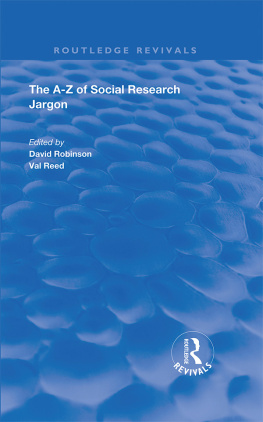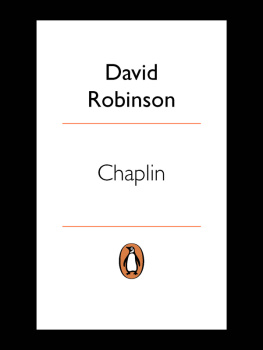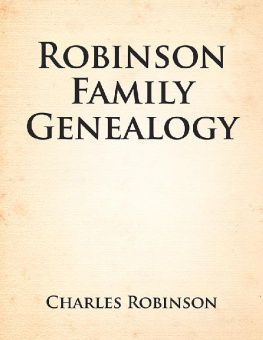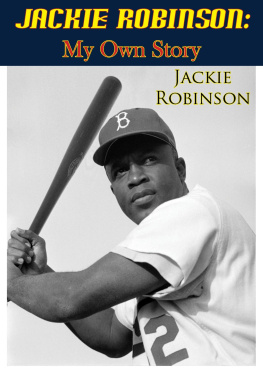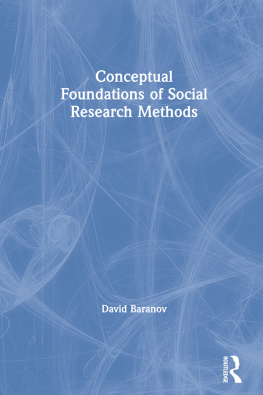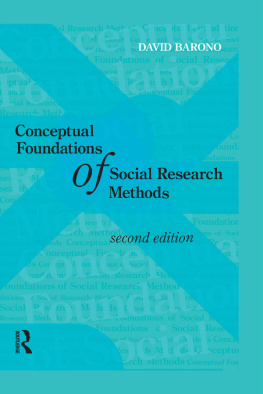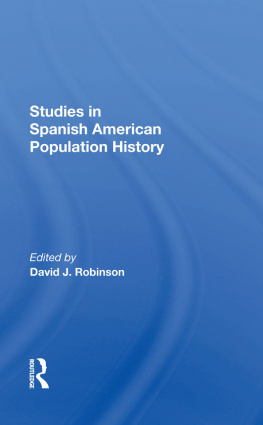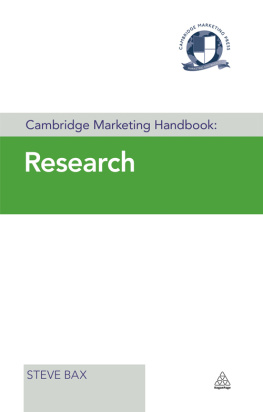The A-Z of Social Research Jargon
First published 1998 by Ashgate Publishing
Reissued 2018 by Routledge
2 Park Square, Milton Park, Abingdon, Oxon, OX14 4RN
52 Vanderbilt Avenue, New York, NY 10017
Routledge is an imprint of the Taylor & Francis Group, an informa business
Copyright David Robinson and Val Reed 1998
All rights reserved. No part of this book may be reprinted or reproduced or utilised in any form or by any electronic, mechanical, or other means, now known or hereafter invented, including photocopying and recording, or in any information storage or retrieval system, without permission in writing from the publishers.
Notice:
Product or corporate names may be trademarks or registered trademarks, and are used only for identification and explanation without intent to infringe.
Publishers Note
The publisher has gone to great lengths to ensure the quality of this reprint but points out that some imperfections in the original copies may be apparent.
Disclaimer
The publisher has made every effort to trace copyright holders and welcomes correspondence from those they have been unable to contact.
A Library of Congress record exists under LC control number: 97049326
ISBN 13: 978-1-138-34110-4 (hbk)
ISBN 13: 978-0-429-44034-2 (ebk)
Although there are numerous publications and locally produced handouts which set out to introduce health practitioners to research, these frequently assume working knowledge of the research vocabulary. Quite often they introduce more terminology without necessarily clarifying any. Meanwhile, the growing number of research reports, theses and journal articles themselves introduce more and more terms which add to the perplexity of practitioners.
Research reports, especially those originating from unfamiliar disciplines, can alienate health carers because of their specialised presentation. Generally speaking, writers on research have only lately begun to translate research terms and findings meaningfully and understandably for the practitioner.
Textbooks dealing with method frequently offer glossaries which explain specific research terms. However these are rarely exhaustive and tend to be written for the initiate rather than for the novice. Research terms need careful and painstaking presentation in order to overcome unnecessary semantic barriers. The main aim of this little book is to help break down the barriers sometimes built unintentionally by academic writers and explain key issues in accessible language.
The book, which contains more than 290 terms, is written firstly to assist those completely new to research to gain insight into the vocabulary. Secondly, we hope it will allow those already familiar with basic terms further to explore some related concepts. Thirdly, we hope it will foster creative curiosity and the desire to read further. We have taken into account issues stressed by many health practitioners; the resultant text has been carefully structured to offer the reader at all levels examples of terms and definitions in a handy format. The general shape of each entry is as follows:
Term: many of these are terms used in everyday research. There are also some terms which, while not exclusive to research, are certainly relevant, since they deal with related subjects such as ethics, philosophy and informatics.
Everyday use: the colloquial or ordinary language origin of a research term is given to provide the background from which it has acquired its special use. This is a short, lay explanation with meaningfulness as its first aim.
Research use: here the stipulative definition used by researchers is given. This enables the reader to compare ordinary language with research versions. Equating everyday with research usage is an important step in learning research terms.
Example: here practical research example(s) are offered to help the reader establish how terminology is used. Descriptions of practical research in action have been chosen to reflect frequently occurring situations often encountered by health carers in the contexts of their daily work.
Related terms: these are listed to highlight terms usually associated with the key term. Detailed definitions of these can be found elsewhere in the text.
Editors
David Robinson is Senior Nurse for Research and Development at Rampton Hospital Authority, and has been involved in fulltime research since 1986. Programmes have been carried out on a wide variety of topics including: descriptive accounts of forensic psychiatric nursing care; community liaison evaluation; quality of life studies; and care and risk assessment. These have been frequently reported through conferences and publications at national and international level. Following PhD completion in 1994 he has been involved with the development of European research programmes; developing new databases in forensic research and development with the NHS Centre for Reviews and Dissemination; and is currently the chair of the National Forensic Nurses Research and Development Group.
Val Reed is a psychiatric nurse and developmental psychologist with more than 30 years experience in research education of health professionals. He has a First Class Honours degree in education; a Masters degree in educational psychology; and a PhD in social learning studies with children with learning disabilities. He has served as scientific advisor to the Department of Health and on numerous departmental committees including the Nursing Process Evaluation Working Group chaired by Dame Phyllis Friend. His research involvement includes psychometric studies of social learning; and cross-cultural studies of health care in the United Kingdom, Egypt and the Indian sub-continent. He is currently a visiting professor in the School of Community Health and Social Studies, Anglia Polytechnic University; and research consultant to the Ashworth and Rampton Hospital Authorities.
Contributors
Mick Collins Rampton Hospital Authority
Graham Durcan Sainsbury Centre for Mental Health
Tom Mason Liverpool University
Dave Mercer Ashworth Hospital Authority
Val Reed Anglia Polytechnic University
David Robinson Rampton Hospital Authority
The editors gratefully acknowledge
the huge and perplexing task successfully completed by the contributors in preparing the materials for this book (de-mystifying research is no easy task!);
the key facilitative role of Frank Powell, Special Hospitals Service Authority, without whose enthusiastic support we would be precisely nowhere;
formative and highly enjoyable discussions of early drafts with members of the SHSA Nursing Research and Development Group when we met at Ashworth, Broadmoor, Carstairs and Rampton Hospitals;
the critically important work of Bridget Bower (Rampton Hospital Authority) and Anne Dean (Sheffield Hallam University) in preparing draft typescripts and reading and constructively criticising the editors work.
Abstract
Everyday use: summary of a larger piece of work.
Research use: a two- to three-hundred-word summary giving the reader an overview of the research paper or thesis to follow. Also sometimes referred to as a

